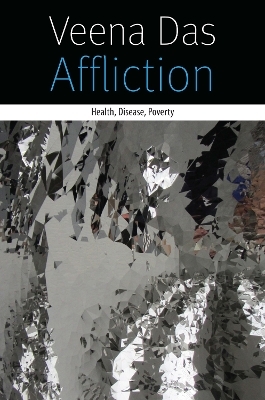
Affliction
Health, Disease, Poverty
Seiten
2015
Fordham University Press (Verlag)
978-0-8232-6181-9 (ISBN)
Fordham University Press (Verlag)
978-0-8232-6181-9 (ISBN)
Focusing on low-income neighborhoods in Delhi, this book stitches together three different sets of issues. It examines the different trajectories of illness: What are the circumstances under which illness is absorbed within the normal and when does it exceed the normal putting resources, relationships, and even one's world into jeopardy?
Affliction inaugurates a novel way of understanding the trajectories of health and disease in the context of poverty. Focusing on low-income neighborhoods in Delhi, it stitches together three different sets of issues.
First, it examines the different trajectories of illness: What are the circumstances under which illness is absorbed within the normal and when does it exceed the normal—putting resources, relationships, and even one’s world into jeopardy?
A second set of issues involves how different healers understand their own practices. The astonishing range of practitioners found in the local markets in the poor neighborhoods of Delhi shows how the magical and the technical are knotted together in the therapeutic experience of healers and patients. The book asks: What is expert knowledge? What is it that the practitioner knows and what does the patient know? How are these different forms of knowledge brought together in the clinical encounter, broadly defined? How does this event of everyday life bear the traces of larger policies at the national and global levels?
Finally, the book interrogates the models of disease prevalence and global programming that emphasize surveillance over care and deflect attention away from the specificities of local worlds. Yet the analysis offered retains an openness to different ways of conceptualizing “what is happening” and stimulates a conversation between different disciplinary orientations to health, disease, and poverty.
Most studies of health and disease focus on the encounter between patient and practitioner within the space of the clinic. This book instead privileges the networks of relations, institutions, and knowledge over which the experience of illness is dispersed. Instead of thinking of illness as an event set apart from everyday life, it shows the texture of everyday life, the political economy of neighborhoods, as well as the dark side of care. It helps us see how illness is bound by the contexts in which it occurs, while also showing how illness transcends these contexts to say something about the nature of everyday life and the making of subjects.
Affliction inaugurates a novel way of understanding the trajectories of health and disease in the context of poverty. Focusing on low-income neighborhoods in Delhi, it stitches together three different sets of issues.
First, it examines the different trajectories of illness: What are the circumstances under which illness is absorbed within the normal and when does it exceed the normal—putting resources, relationships, and even one’s world into jeopardy?
A second set of issues involves how different healers understand their own practices. The astonishing range of practitioners found in the local markets in the poor neighborhoods of Delhi shows how the magical and the technical are knotted together in the therapeutic experience of healers and patients. The book asks: What is expert knowledge? What is it that the practitioner knows and what does the patient know? How are these different forms of knowledge brought together in the clinical encounter, broadly defined? How does this event of everyday life bear the traces of larger policies at the national and global levels?
Finally, the book interrogates the models of disease prevalence and global programming that emphasize surveillance over care and deflect attention away from the specificities of local worlds. Yet the analysis offered retains an openness to different ways of conceptualizing “what is happening” and stimulates a conversation between different disciplinary orientations to health, disease, and poverty.
Most studies of health and disease focus on the encounter between patient and practitioner within the space of the clinic. This book instead privileges the networks of relations, institutions, and knowledge over which the experience of illness is dispersed. Instead of thinking of illness as an event set apart from everyday life, it shows the texture of everyday life, the political economy of neighborhoods, as well as the dark side of care. It helps us see how illness is bound by the contexts in which it occurs, while also showing how illness transcends these contexts to say something about the nature of everyday life and the making of subjects.
Veena Das is Krieger-Eisenhower Professor of Anthropology at the Johns Hopkins University.
Preface 1. Affliction: An Introduction 2. How the Body Speaks 3. A Child Learns Illness and Learns Death 4. Mental Illness, Psychiatric Institutions, and the Singularity of Lives 5. Dangerous Liaisons: Technology, Kinship, and Wild Spirits 6. The Reluctant Healer and the Darkness of our Times 7. Medicines, Markets, and Healing 8. Global Health Discourse and the View from Planet Earth 9. Epilogue Note Bibliography Index
| Erscheint lt. Verlag | 1.1.2015 |
|---|---|
| Reihe/Serie | Forms of Living |
| Verlagsort | New York |
| Sprache | englisch |
| Maße | 152 x 229 mm |
| Themenwelt | Studium ► 1. Studienabschnitt (Vorklinik) ► Med. Psychologie / Soziologie |
| Studium ► Querschnittsbereiche ► Geschichte / Ethik der Medizin | |
| Sozialwissenschaften ► Soziologie | |
| ISBN-10 | 0-8232-6181-6 / 0823261816 |
| ISBN-13 | 978-0-8232-6181-9 / 9780823261819 |
| Zustand | Neuware |
| Haben Sie eine Frage zum Produkt? |
Mehr entdecken
aus dem Bereich
aus dem Bereich


